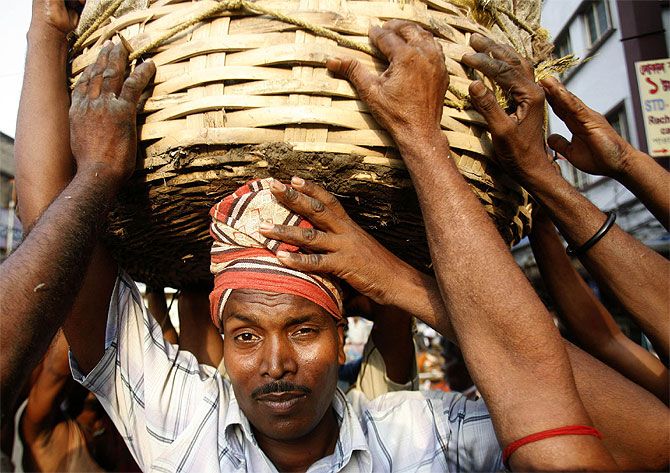Indian companies, particularly small and mid-cap firms, carry Asia's biggest debt burden because of their aggressive borrowing in the boom years after the 2008 global crisis.
 Indian firms battling towering debts are calling for more interest rate cuts as they worry the central bank is tying monetary policy too much to consumer inflation and ignoring the longest streak of wholesale price falls on record.
Indian firms battling towering debts are calling for more interest rate cuts as they worry the central bank is tying monetary policy too much to consumer inflation and ignoring the longest streak of wholesale price falls on record.
Reserve Bank of India (RBI) Governor Raghuram Rajan in 2014 started using consumer prices as the bank's key inflation measure to focus policy on ordinary Indians.
This year, the link between consumer prices and monetary policy became even stronger as the RBI formally adopted an inflation-targeting regime.
But a growing divide between consumer and wholesale inflation has revived a long-standing debate on which inflation measure should be used to determine India's interest rates.
The wholesale price index (WPI) has been falling since late 2014, dragged down by lower energy costs, while the consumer price index (CPI) is currently at 5 per cent.
The RBI has cut interest rates three times this year as corporate profits shrank and companies small and large shied away from new investments.
But India's hundreds of indebted companies are saying that's not enough.
They argue the RBI has room to further ease policy, as the WPI has dropped for an unprecedented seven straight months.
"It may not be suitable to be focussed on only one (inflation) index at a point in time," said R. Shankar Raman, chief financial officer of infrastructure conglomerate Larsen & Toubro.
"Just as focus on WPI alone is not going to serve the purpose, focussing on CPI alone is also not going to serve the purpose," he added, referring to kick-starting economic growth.
That echoes the argument made by India's chief economic adviser, Arvind Subramanian, who last month suggested that in "unusual times" of stress, a policy based on consumer prices alone may not reflect firms' realities.
Rajan has not publicly spoken about the discrepancy, but some policymakers have attributed the widening gap between the two indices to commodity prices, and not to deflationary forces in the economy.
The RBI could not immediately comment.
The reality is lower interest rates reduce the cost of borrowing. In India, bank loans continue to form the lion's share of corporate financing, even though fund-raising in the equities market, for example, has increased this year.
Indian companies, particularly small and mid-cap firms, carry Asia's biggest debt burden because of their aggressive borrowing in the boom years after the 2008 global crisis.
Total debt for listed Indian companies excluding financials fell only 4 per cent to $368 billion in the year ended in March 2015.
Adding to their woes, banks have yet to pass on most of the RBI rate cuts. The central bank has reduced its policy rate INREPO=ECI this year by a total of 75 basis points to 7.25 per cent.
But banks have cut their rates by an average of 25 to 30 basis points, reducing incentive for companies to increase investment.
Monsoon
Rajan ended the RBI's decades-long focus on wholesale inflation in January last year. At that time, CPI was 8.79 per cent, much closer to wholesale inflation of 5.11 per cent.
But that decision is now coming under increasing scrutiny as firms struggle and Rajan has tied any additional easing to how food prices react to the current monsoon season.
That is prompting concern he is turning cautious on rate cuts despite a struggling corporate sector and an unprecedented period of deflation as measured by the WPI, which is less affected by food and energy costs and does not reflect the services sector.
Profits for the top 96 listed companies with at least $100 million in market capitalisation slumped 10.5 per cent in January-to-March, the most in at least three years, according to Thomson Reuters data.
Estimates for the following quarter point to another lacklustre three months.
"There is no clear proof that CPI is far superior to WPI," said Siddharth Sanyal, India economist for Barclays in Mumbai.
"Monetary policy should not ignore the reality of persistent deflationary numbers on the wholesale index."
(Additional reporting by Shilpa Murthy in Bengaluru)











